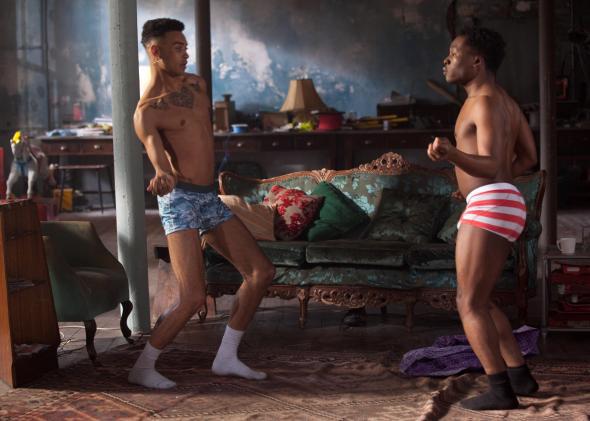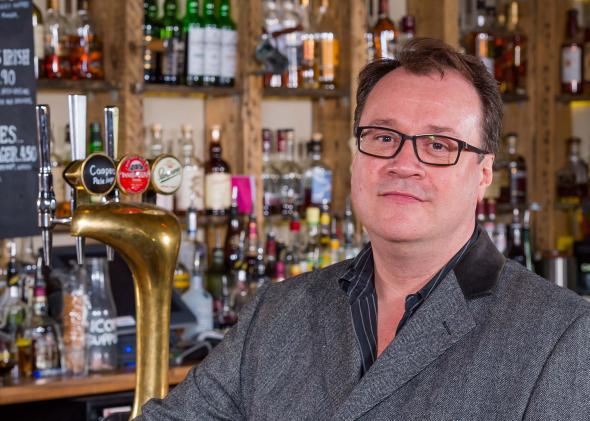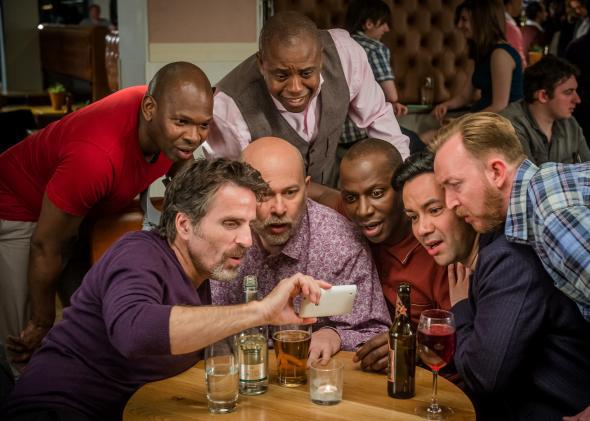Russell T. Davies is one of Britain’s most celebrated TV writers, best known to a certain section of the population for his role in reviving Doctor Who, but beloved by others for his work expanding television’s LGBTQ universe with shows like the original U.K. Queer as Folk and Bob & Rose. His latest projects, Cucumber and Banana, which premiere on Logo Monday night, are intersecting dramas: Cucumber tells the story of Henry, a middle-aged gay man whose life falls apart in the opening episode, while Banana focuses on the younger queer people in Henry’s orbit.
I spoke with Davies about telling new gay stories, intergenerational relationships, and why so many of his shows are set in Manchester, England.
At the beginning of Cucumber, someone says, “the whole world is a gay bar now,” Has the mainstreaming of gay culture made it harder to write shows about queer people?
There is a mainstreaming, and I think that’s magnificent. Certainly in Britain and in America, there are all sorts of gay stories cropping up. We will always complain that there could be more—it’s natural for a minority to complain that we’re not visible enough. At the same time, we’re getting more and more niche broadcasting, which demands shows for gay people, for middle-aged white women, for ethnic communities. We’re at a funny time of transition where no one’s quite sure if we’re searching for a mass audience or for niche audiences. In the end, though, people like a good story, and if you’re exploring characters that haven’t been explored in those ways before, then people will like that.
I’m fascinated by the ways that Cucumber and Banana intersect. Intersecting works of art are very big right now—in literature, as well as on-screen. As a viewer, it’s thrilling to realize that you’re seeing events from different perspectives. Why did you want to have that element?
In some ways, this comes from the modern novel, which is breaking down more and more into shorter stories that are linked. I loved reading Jennifer Egan’s A Visit From the Goon Squad—sometimes the links are evident, sometimes they’re not. A lot of novelists are deconstructing things that way. It’s also a reflection of the way television is digitizing itself. If you walk into a broadcaster with a drama, they will ask you: What extra content could we have? Let’s think about the DVD extras, think about the commentary. Often, that extra material is secondary. I walked in with the extra material in-built. It wasn’t just an add-on; it’s part of the creativity of the show.
I’m making it all sound like a business deal, but I had a genuine motive to embrace those platforms, because I knew that in terms of the gay experience, there were a lot of voices that would be left out of Cucumber, because Cucumber is about Henry, a 46-year-old gay man. It’s not Cucumber’s role to tell stories about women, stories about lesbians, certain ethnic stories. It’s literally Henry’s story, so I thought there’s got to be a way to get those other voices in. Banana was invented to tell other stories, trans stories, lesbian stories.

Photo by Jonathan Young and Danielle Baguley; courtesy of Logo
Obviously intergenerational relationships have always been big in your work from the relationship between Stuart and Nathan in Queer as Folk and Henry’s interactions with young people on these new shows, but it’s also, of course, the foundational question for Doctor Who, who’s always dealing with people who are much younger than him. Where does that interest come from?
It’s the way of the world. A lot of things run through my work constantly, and that’s one: It’s the shape of a human being working their way through Western society. You work with people younger and older. I keep watching television, thinking television will never be realistic until you give children voices in drama. In every single drama we make, the children just have two lines. We have to write the children better, because we’re not representing life accurately on the screen. Once you’re writing stuff accurately, your imagination can get really to work.
This intergenerational mixing feels more important for gay people, because we don’t learn about gay culture from our parents. We learn about it traditionally from older people but nowadays, I guess, from the Internet.
Yes, there are literal differences between our generations now. If you’re 20 years old, you are legal, you can marry, you’re on a completely equal legal footing. It’s not like I was closeted when I was young, but it was a different world. The generations keep on changing. At the same time, I wanted to explore how, actually, things don’t change that much. You’ve got equality. You can get married. The law’s on your side. That doesn’t make you happy. That’s never made straight teenagers happy. They can be white and wealthy, and they’re still not happy. So, I wanted to show that young, gay people are beleaguered by problems. They’re just as fantastically, hilariously full of problems as they’ve ever been.
In Banana, the young gay people often have supportive families, but that doesn’t make them happy. One young guy is living out a fantasy of being treated badly by his family. Where did that come from?
What Dean’s done is received this as a story and used it, as all young kids do. They get ahold of a bit of drama, and they use it to suit themselves. We’ve all done that. I’ve met that boy a thousand million times, and I thought it was time he was brought on screen. The only story you ever get told within gay culture is the boy who’s thrown out of his home. It does happen, and I’m immensely sorry for those people, but dare I say, it’s quite rare now. It’s about time we actually started to say that’s not the only gay experience.

Photo courtesy of Logo
Henry, who is at the center of Cucumber, is self-absorbed and oblivious, and his selfishness always seems to be causing other people pain. How do you see him?
I think he’s glorious. I absolutely love him. I can see that he’s tough meat sometimes—a character like that is never going to be the lead scientist in CSI, but I think it’s time to take a deep breath and say: These are adult dramas, for adults, so they can have adult characters in them. You wouldn’t have a problem with a character like that in a novel. I don’t think you’d have a problem with a character like that on stage or in an indie film. I think it’s a measure of how bland a lot of television is that Henry seems in any way remarkable. He’s not remotely remarkable. I want more people like Henry on screen, because he can be selfish, he can be venal, he can lie. So can I, and I’m actually quite a nice man.
The whole eight hours is an examination of Henry, coming to terms with who he is and understanding him. There are no big reveals. You don’t learn in Episode 7 that he was abused. That doesn’t happen, but you do find out about his life. If you don’t understand that man by the end of Episode 8, you never will.
So many of your shows—Queer as Folk, Bob and Rose, and now Cucumber and Banana— have been set in Manchester. Why?
For me there’s other no choice. London is the center of the television and film industry, but I’ve never lived in London. I’ve always had a policy of demanding that things are made outside London. These big, central cities are too monolithic. There are other voices out there, other experiences, other stories. Also, I tend to set stuff where I’m living, and I’ve been in Manchester for 28 years. One of the problems with Doctor Who was that he traveled all over the universe, so I made a spinoff called Torchwood, which I then set in Cardiff, because I wanted Cardiff to be visible around the world. I wanted American viewers to see how beautiful Cardiff is, and I wanted them to come and explore the place.
In all your Manchester-set shows, even when the characters are relatively successful and established, their world is never particularly shiny. You don’t shy away from the grime.
It’s a tradition of British writing. All television writing in Britain is founded upon the success of the primetime soap opera, and British soap operas are very different from American ones: They’re very much based in reality, and they come from a working-class tradition. I do think things are changing in America now. If you look at the viewing figures for The Walking Dead, it’s an amazing hit with a massively varied ethnic cast. I think the cast is absolutely beautiful in all sorts of ways, but you don’t have to be a glamour model to be on that show.
It’s a fascinating time in television. The monoliths established by the white, straight male are crumbling, because we’re getting bored of those stories. We’re realizing the world is richer. I think TV in particular is responsible for reminding us that the world is not just composed of people exactly like ourselves and that everyone’s got a story to tell. Actually, there is nothing a human being loves more than a brand new story. In the past five years, suddenly there’s been a rise in ethnic backgrounds, different sexualities, just different voices on screen. It’s very exciting.
Several characters, gay and straight, make a big deal about Henry and his boyfriend, Lance, never having had anal sex. I was surprised that so many people considered that particular act to represent “real sex.”
[Henry’s sister] very clearly says, You don’t have to have sex. Or you can have whatever form of sex you want. But the fact that Henry keeps it a secret says that there’s a problem. I think that for a lot of homophobes, their target is the physical act. Terror of male penetration makes them react against an entire race of people. There are lots of men who don’t like penetrative sex. That’s fine. So why isn’t it spoken about? Every few years, there’ll be a great big sex survey in Gay Times. Within these surveys, there’s always a statistic that asks “Do you have penetrative sex with your partner?” Over the years, I’ve seen figures from 20 percent to 40 percent of people saying no, which is fine. But what interests me then is that you keep on reading the survey, and this isn’t spoken about at all. No analysis, no commentary, no headline. So, it’s me being fascinated with the stuff we’re not talking about. That’s where the drama and the character lie, the stuff that isn’t being said.
This interview has been edited and condensed.
